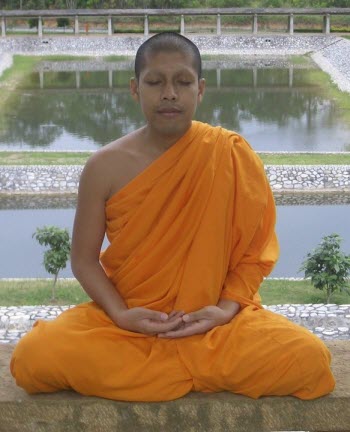Blessing Sixteen:
Dhamma Practice
B. PRACTICE FOR PURITY
There are many ways of practising good deeds for your own benefit, but in this Blessing we emphasize the groupings of good deeds which boost our sense of responsibility for our own human dignity.
B.1 Avoiding the Defilements of Action
Firstly, it is vitally important that we avoid the four defilements of action [kāmakilesa], namely:
1. Killing people or animals [pāṇātipAta];
2. Stealing or taking what is not given [adinnādāna]
3. Adultery or sexual intercourse outside marriage [kāmesumicchācara];
4. Telling Lies [musāvāda];
You will notice that these four forms of behaviour are diametrically to the decent behaviours described in the moral codes of almost any religion. In Buddhism restraint from these behaviours is covered in the first four of the Five Precepts. Keeping the Five Precepts is well known to be the underlying virtue that allows us to be born human. If we want to stay human (i.e. remain humane or respect our own human dignity) then it is necessary to live our lives according to the Five Precepts. Even compromising our behaviour for any single one of the Five Precepts diminishes our humanness by that amount — but that is not the end of it— those human intuitions which we lose are replaced by the same amount of savage or animal instincts. If we are to give up all of our Precepts then we reduce our instincts entirely to the level of a savage [manusso tiracchāno]. The missing fifth Precept, i.e. to restrain oneself from the consumption of alcahol or substances that cloud the mind [surāmerayamajjapamādaṭṭhānā veramaṇī] is not included in the Four Defilements of Action, but reappears later in Blessing Nineteen.
A person who cannot manage to restrain himself from these defilements of action compromises their own human dignity — they will have no scruples about constantly taking advantage of other people both in their presence and behind their backs. If they have neither fear nor shame of evil or its consequences then nothing will be left of their respect for human dignity.
Anyone who can abstain from the Four Defilements of Action is someone established in self-discipline because they are able to keep the Precepts — they neither harm others nor take advantage of them. Because such a person does nothing to harm society, then it can be considered as social responsibility to a certain extent.
B.2 Cultivating the Five Virtues [pañcadhamma]
If we want to go further than simply avoiding taking advantage of others, in Thai Buddhist culture there is a traditional set of virtues called the “Five Virtues” [pañcadhamma] which build on the virtues of abstinence cultivated in the Five Precepts, namely:
1. Compassion (controlling all the nasty things that come from the body in a way that will not offend them (personal cleanliness to the eye and to the nose; well-spoken (courteous & express concern for others); good manners; going out of your way to help others; not doing things to create suspicion in others;
2. Generosity: This means giving resources, time, forgiveness, attention, teaching, advice (see Blessing Fifteen for full details);
3. Contentment with one’s spouse: This means being faithful to one’s spouse (if applicable) and actively practising the virtues that keep a marriage going (see Blessing Thirteen for full details);
4. Truthfulness in everything you say, honesty to yourself, earnestness in every task you do and earnestness towards good deeds. Train yourself to do your very best in every task that comes to you. Train yourself to be a person of principle, honest to yourself and honest to other people. You will find that all ten of the principles above will come automatically;
5. Mindfulness train yourself to keep your mind at the centre of the body the whole of the time whether you have your eyes closed for meditation or open for other duties you perform during your life. Meditate too to give yourself the encouragement to keep practicing because you are getting to the roots of the problems that crop up in life.
Cultivating any or all of these virtues will add to the strength of accumulated positivity in the mind that will be able to change our mind from negative to positive on a more regular basis. Even if we have negative things in our past — the things we have done and which we may now regret — by building up more and more positive deeds in the way we mention above will allow us to dilute the regrets and anxieties we have in our minds.
B.3 Fulfilling the Tenfold Path of Wholesomeness
Our aim in cultivating these virtues is to establish oneself in the Tenfold Path of Wholesomeness [kusaladhammapatha] which we have already seen in Blessing Nine:
1. absolutely not killing
2. absolutely not stealing
3. absolutely not committing adultery
4. absolutely not lying
5. absolutely not gossiping
6. absolutely not speaking harshly
7. absolutely not chattering idly
8. absolutely not thinking to take the possessions of others
9. absolutely removing yourself from vengefulness
10. absolute possession of Right View

http://goo.gl/Z6sTE








 พิมพ์บทความนี้
พิมพ์บทความนี้